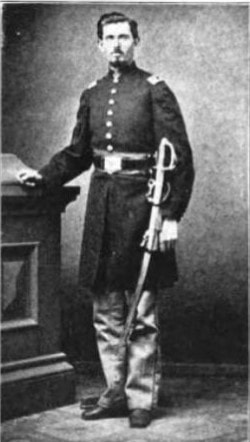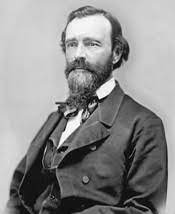
Born October 7, 1834 in Colrain, Massachusetts, Hollister, who went by the nickname of "Vando," had very little education as a child. He was raised within a Shaker society in eastern New York, earning his room and board as a farm laborer. Sometime in the 1850s, Hollister moved to Kansas, where he found work on a farm.
 Just imagine living here in the winter!
Just imagine living here in the winter!  Samuel Cook
Samuel Cook Cook intended to ride his men to Kansas, where they would serve under General James Lane. Colorado Governor Gilpin had other plans. He convinced Cook and his men that if they stayed in Colorado and joined what was to become Company F of the First Regiment of the Colorado Volunteers, they would be given horses and be well armed and equipped. Cook became the company’s captain. George Nelson, who had shared a tent and gold claim with Cook became one of the company’s lieutenants. Hollister was made sergeant.
 Governor Gilpin
Governor Gilpin Because Washington had provided no funding for the formation of troops, Gilpin issued his own script, which paid for uniforms, arms, supplies and equipment for the troops and for the building of Camp Weld, located about two miles from the small town of Denver. On February 14 1862, Major General Hunter ordered all the available forces that Colorado could spare to go south to aid Colonel Canby, the commander of the Department of War in New Mexico. They left on February 22, marching through snowstorms and high winds until they reached Fort Union on March 10th.
Hollister later described the hardships and frustrations of that forced winter march by the Colorado Volunteers. His account makes it clear why Colonel Slough was not beloved of his troops.
The teams, relieved of their loads, took aboard a full complement of passengers, leaving, however, between three and four hundred to foot it. Away into the wee hours of morning did we tramp, tramp, tramp, --the gay song, the gibe, the story, the boisterous cheer, all died a natural death. Nothing broke the stillness of night but the steady tramp of the men and the rattle of the wagons. We were now to prove the sincerity of those patriotic oaths so often sworn, and right nobly was it done. At length the animals began to drop and die in harness, from overwork and underfeed, which forced us to stop. But for this, we would doubtless have made Union without a halt. Col. Slough rode in the coach. That never stops between Red River and Union. Why should we? Thirty miles would not more than measure this night's march, in which the men proved their willingness to put forth every exertion on demand. But feeling as they did, that there was no call for it but the Colonel's caprice, their 'curses were not loud but deep.' During the halt, they hovered over the willow brush fires or shivered under their scanty blankets, nursing their indignation by the most outrageous abuse of everything and everybody. A soldier would grumble in heaven. As it is all the solace they have for their numerous privations and vexations, and is very harmless, let them growl.
At the first sign of daylight "Assembly" sounded as shrilly as if waking to renewed exertion the iron sinews of a steam engine, instead of a weary mass of human energy scarcely composed to rest. But it was none the less inexorable, and satisfying nature with a crust of hard bread, we were on the road again.

Jennifer is an accomplished speaker who loves to present on the history of New Mexico and on other topics to school groups, libraries, and historical societies.


